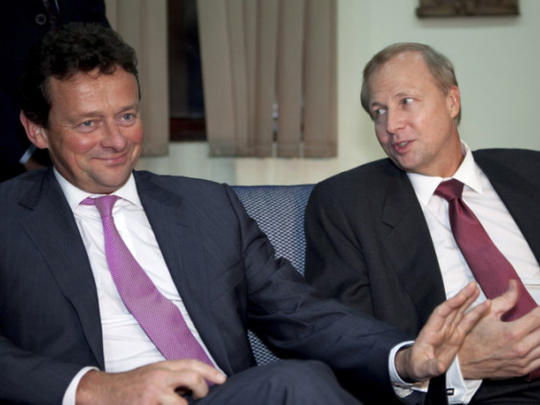
London: After the critical mauling former BP boss Tony Hayward received for his handling of Gulf of Mexico blowout, you would think he’d want a quiet life. But instead, his new job as boss of Genel Energy has put him at the centre of a skirmish between the oil barons of Iraq and Kurdistan.
Genel, whose backers include Nat Rothschild, has taken a bet on Kurdistan being the next big province for the oil industry and recently increased its stake in an exploratory field there. So the City will want to know Hayward’s take on the argy-bargy between Baghdad and Erbil at the company’s half-year results on Thursday. Iraq has threatened to cut ties with foreign oil companies if they violate Iraqi law and proceed with upstream work in the self-governing region. Kurdistan, meanwhile, is close to completing a pipeline to Turkey that will enable its producers to bypass Iraq altogether.
Mehmet Sepil, Genel’s president, is already feeling chipper: “Baghdad has lost its oil and natural gas fight against northern Iraq. Baghdad says it will put those who operate in northern Iraq on a blacklist but the largest companies in the world are working there. The energy fight is over today. The important question is when Baghdad will admit this.” My guess is not any time soon.
Premier still in choppy waters
There will be another chance to take the temperature of the (political) waters of the South Atlantic when plucky British explorer Premier Oil reports its first-half figures on Thursday.
Last week rival Desire Petroleum did its best to drum up excitement over the chances of a commercial oil strike off the Malvinas, as Buenos Aires likes to calls them. The buzz bodes well for Premier, which recently bought a 60 per cent stake in Aim-listed Rockhopper Exploration’s interests in the Falkland Islands to get its hands on some of the action in the Sea Lion field, which could have between 400 million and 500 million barrels of recoverable reserves.
But the oil companies are battling in choppy seas, as the Argentinian government is threatening to take anyone “illegally” drilling off the disputed islands to court. The British government has promised to stand by its explorers, and many industry experts point out that the Argentinian court threats are highly unlikely to stand up under international law.
But some equity analysts have since questioned the wisdom of Premier choosing to put so many of its eggs into such a fragile basket. The chief executive, Simon Lockett, will need to explain why the Sea Lion should be allowed to roar.
Another hurdle for BAA
BAA, the owner of Heathrow airport, had a quietly successful Olympics which counts as a major achievement for one of the UK’s more pilloried businesses. Given that success for BAA consists of not being caned by the national press on a daily basis, a glitch-free Games is cause for celebration. But it faces a more complicated repeat of that test on Wednesday when it is expecting its busiest arrival day for Paralympians, with more than 1,000 athletes expected to arrive while the airport handles about 190,000 passengers at the same time.
It will be an interesting introduction for BAA’s newest prospective shareholder, Qatar Holding, which has agreed to acquire a 20 per cent stake in the business. Spain’s Ferrovial, which once owned 55 per cent of BAA, will soon find its stake dipping below 40 per cent. If the next few weeks go smoothly, as they hopefully should, then perhaps BAA can begin to think it has banished the operational glitches that have bedevilled its recent history, not least the terrible handling of the 2010 snow crisis. If errors abound, however, the ensuing media and political reaction might make the Qataris wonder what they have let themselves in for.












